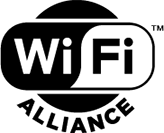It is well known that the Wi-Fi® ecosystem delivers enormous benefits to consumers, businesses, and economies around the world. Wi-Fi connects millions of people and billions of devices to the Internet. But is it possible to quantify this benefit?
A study commissioned by Wi-Fi Alliance® provides an up-to-date assessment of Wi-Fi's value. This comprehensive study estimates that the global economic value of Wi-Fi will reach $3.3 trillion in 2021, and projects it will reach $4.9 trillion by 2025. These forecasts suggest an increase of nearly $3 trillion in value from 2018 to 2025 – a 150 percent growth – underscoring Wi-Fi as a very significant global economic engine.
The study also projects that the value of Wi-Fi 6 and Wi-Fi 6E technology will increase from $58 billion this year to $527.5 billion in 2025. This estimate supports ongoing efforts in many countries to open the 6 GHz spectrum for Wi-Fi access. Recognizing the importance of Wi-Fi 6E for connectivity, technological competitiveness, and economic value, administrations around the world are moving forward on opening the 6 GHz frequency band for Wi-Fi use.
The COVID-19 pandemic has dramatically increased the demand for Wi-Fi connectivity due to the broad use of teleworking, remote learning, home schooling, entertainment, and online commerce. A recent study indicates that the demand for Wi-Fi connectivity has increased at an unprecedented rate, particularly for Wi-Fi data consumption, and the number of actively used devices. The European Commission also cited Wi-Fi as vital to supporting the European Union’s recovery from COVID-19 in its recently published State of the Union. A complementary report underscores the important role Wi-Fi plays in mitigating the effects of the pandemic.
Policymakers worldwide recognize the critical role of Wi-Fi technology in sustaining connectivity during the pandemic. Wi-Fi Alliance advocacy has been a key contributor to this transformative policy shift, and Wi-Fi Alliance will continue to work with regulators to expand and harmonize Wi-Fi access worldwide. These efforts will help secure both the social and economic benefits Wi-Fi provides, enable innovations, and help the industry deliver much needed telecommunication and information services.
The statements and opinions by each Wi-Fi Alliance member and those providing comments are theirs alone, and do not reflect the opinions or views of Wi-Fi Alliance or any other member. Wi-Fi Alliance is not responsible for the accuracy of any of the information provided by any member in posting to or commenting on this blog. Concerns should be directed to info@wi-fi.org.




Add new comment